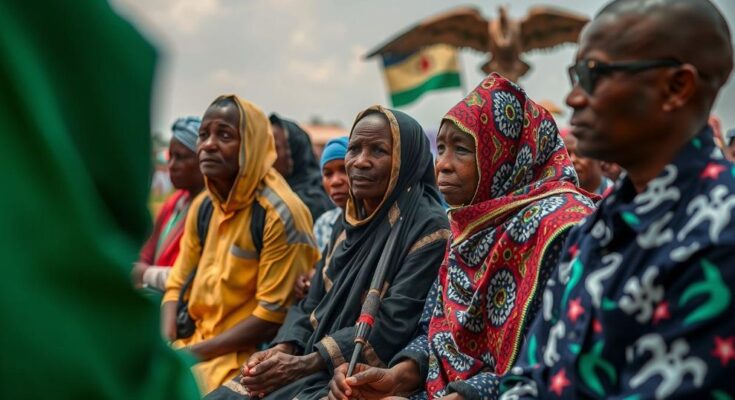The overlap of foreign powers in Sudan’s civil war has become alarming, with growing civilian casualties and a humanitarian crisis. The UAE’s accusations against the SAF highlight the conflict’s tragic dimensions, compounded by reported war crimes and starvation tactics against civilians. Efforts for resolution falter amidst disproportionate foreign interests involving arms and strategic resources. The urgency of international involvement, especially from the UK and other powers, is crucial in addressing Sudan’s escalating crisis.
The severe involvement of foreign powers in the ongoing civil war in Sudan has gained significant attention, driven by rising civilian casualties and humanitarian crises. Since the conflict erupted in April 2023, tens of thousands have lost their lives, primarily among civilians. Recently, the United Arab Emirates (UAE) accused the Sudanese Armed Forces (SAF) of airstrikes on its ambassador’s residence in Khartoum, which resulted in extensive damage, a claim the SAF denies, asserting that the rival paramilitary group, the Rapid Support Forces (RSF), backed by the UAE, was responsible. It is undeniable that both warring factions are perpetrating war crimes, fueled by the support of foreign governments that continue to supply arms, exacerbating the humanitarian disaster. Experts from the UN have accused the combatants of employing starvation tactics against 25 million civilians, contributing to the displacement of 10 million individuals and the rapid proliferation of diseases, including cholera, within a context of the world’s largest hunger crisis. Though the autumn harvest might temporarily ease food shortages, the long-term outlook remains bleak. Both factions have actively targeted aid workers, many of whom previously played pivotal roles in the resistance committees during the pro-democracy protests. The implications are severe, as the power struggle between rival leaders inflicts dire consequences on an already vulnerable population. The actions of foreign nations complicate the reality further, especially as the UAE seeks to assert control over critical Red Sea ports and valuable resources such as gold and land. Saudi Arabia and Egypt consistently back the SAF, led by Abdel Fattah al-Burhan, who is simultaneously cultivating ties with Iran. This dynamic has been characterized as a “Middle East war being played out in Africa.” However, diplomatic focus predominantly rests on broader Middle Eastern conflicts, with Sudan’s plight languishing in the shadows. Despite President Biden and the UAE’s leader, Mohamed bin Zayed Al Nahyan, recently engaging in discussions, Sudan received minimal mention in their joint statement, highlighting the neglect of its humanitarian crisis. A report from the Carnegie Endowment for International Peace asserts that the United States has consistently failed to translate its rhetorical support for democracy in Sudan into tangible strategic action or engagement. Attempts to mediate talks between the two generals have faltered, and General Burhan appears misguided regarding his position in the ongoing conflict. Any resolution seems contingent upon significant external influence, particularly from the UAE, Saudi Arabia, and Egypt. As the US remains passive, it falls upon the UK government, as a leading force in the UN Security Council regarding Sudan, to intensify its efforts. Furthermore, strategic cultural actions, such as boycotts by prominent figures, could significantly impact the UAE’s pursuit of an enhanced international image.
The current situation in Sudan stems from a brutal civil war that erupted in April 2023, driven by deep political, social, and economic grievances among various factions. The ongoing conflict has drawn international interest due to the significant involvement of foreign powers, particularly in the form of military support and arms supplies to the combatants. Two principal factions—the Sudanese Armed Forces (SAF) and the Rapid Support Forces (RSF)—are embroiled in a battle for supremacy, with devastating consequences for the civilian population. The humanitarian crisis is exacerbated by tactics including starvation and targeted attacks on food aid workers. The Sudanese struggle for democracy, particularly following the ousting of long-standing dictator Omar al-Bashir, has seen external actors exploiting the chaos for strategic advantage, leading to further complications in achieving peace and stability.
The enduring conflict in Sudan, exacerbated by foreign intervention and manipulation, continues to inflict significant suffering on its civilian population. The involvement of countries like the UAE, Saudi Arabia, and Egypt complicates efforts at peace, as their interests diverge from the humanitarian needs of Sudanese citizens. With international attention fragmented and an evident lack of pressure from influential nation-states, the prospect for resolving the conflict remains grim. It is imperative that global leaders prioritize Sudan’s plight, utilizing diplomatic and public engagement efforts to spur a comprehensive resolution to the crisis.
Original Source: www.theguardian.com




